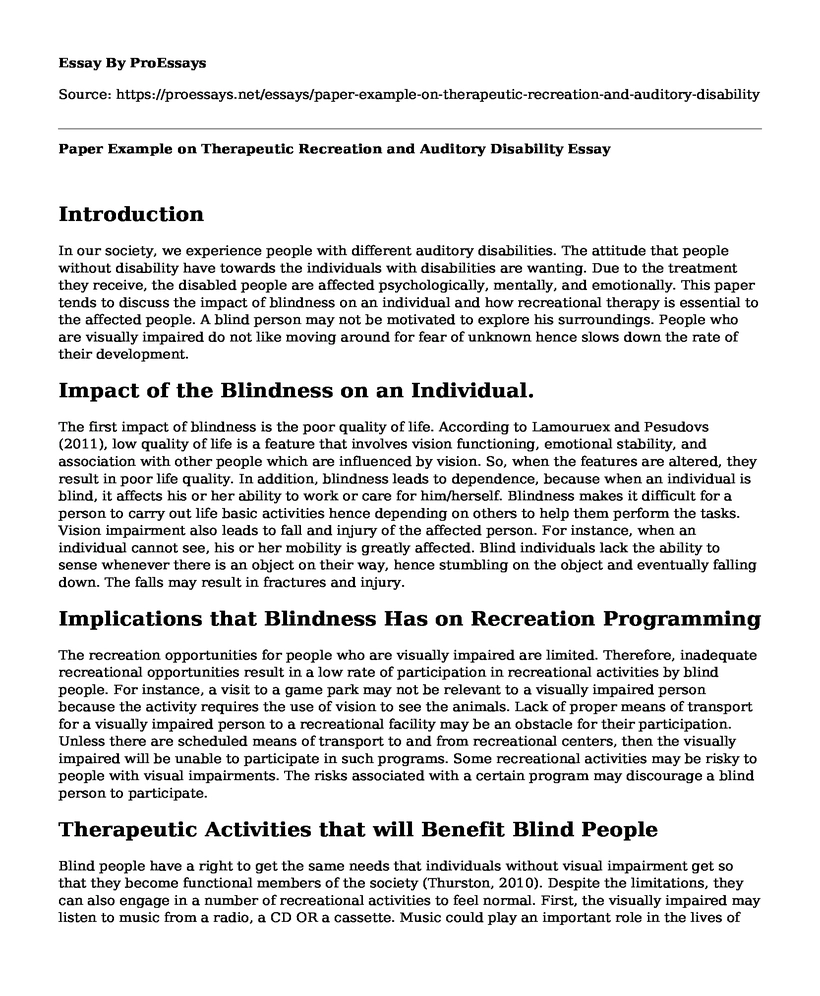Introduction
In our society, we experience people with different auditory disabilities. The attitude that people without disability have towards the individuals with disabilities are wanting. Due to the treatment they receive, the disabled people are affected psychologically, mentally, and emotionally. This paper tends to discuss the impact of blindness on an individual and how recreational therapy is essential to the affected people. A blind person may not be motivated to explore his surroundings. People who are visually impaired do not like moving around for fear of unknown hence slows down the rate of their development.
Impact of the Blindness on an Individual.
The first impact of blindness is the poor quality of life. According to Lamouruex and Pesudovs (2011), low quality of life is a feature that involves vision functioning, emotional stability, and association with other people which are influenced by vision. So, when the features are altered, they result in poor life quality. In addition, blindness leads to dependence, because when an individual is blind, it affects his or her ability to work or care for him/herself. Blindness makes it difficult for a person to carry out life basic activities hence depending on others to help them perform the tasks. Vision impairment also leads to fall and injury of the affected person. For instance, when an individual cannot see, his or her mobility is greatly affected. Blind individuals lack the ability to sense whenever there is an object on their way, hence stumbling on the object and eventually falling down. The falls may result in fractures and injury.
Implications that Blindness Has on Recreation Programming
The recreation opportunities for people who are visually impaired are limited. Therefore, inadequate recreational opportunities result in a low rate of participation in recreational activities by blind people. For instance, a visit to a game park may not be relevant to a visually impaired person because the activity requires the use of vision to see the animals. Lack of proper means of transport for a visually impaired person to a recreational facility may be an obstacle for their participation. Unless there are scheduled means of transport to and from recreational centers, then the visually impaired will be unable to participate in such programs. Some recreational activities may be risky to people with visual impairments. The risks associated with a certain program may discourage a blind person to participate.
Therapeutic Activities that will Benefit Blind People
Blind people have a right to get the same needs that individuals without visual impairment get so that they become functional members of the society (Thurston, 2010). Despite the limitations, they can also engage in a number of recreational activities to feel normal. First, the visually impaired may listen to music from a radio, a CD OR a cassette. Music could play an important role in the lives of individuals with blindness. Visually impaired people may also share jokes which lead to laughter. Studies show that laughter is an ingredient to a healthy life. Cooking is another way to recreate. The person assisting with cooking may methods that can be easily adopted by a blind person. For example, they can use recipes that are in audio and talking scales to measure the cooking ingredients. A person with visual impairment can also engage in craft activities like basket weaving, knitting, and pottery. This will impart him/her with skills that may be a source of income. An individual with blindness can also listen to talking books and magazines. Lastly, gardening is a good way to spent leisure time. A person with seeing disability may orient himself or herself to differentiate between plants and weeds.
Agencies that Provide Services and Materials for Blind People
- Blinded Veterans Association-www.bva.org/BVA
- Foundation Fighting Blindness-www.blindness.org
- Southeastern Guide Dogs-www.guidedogs.org
- Lighthouse Guild-https://www.lighthouseguild.org
- Lions Club International-www.lionsclub.org
- American Foundation for the Blind- www.afb.org
Importance of Providing Therapeutic Services to the Blind People
It is important for therapeutic professionals to provide recreational services to visually impaired people because it will help an individual to be a well-rounded individual in the society. By participating in recreational therapy, there is development in physical and cognitive capabilities of persons with blindness. The recreation therapy enhances the ability of the blind people to plan, and perform tasks that will improve emotional well-being. The therapy is important as it focusses on inclusion by allowing individuals to participate in the activities that they enjoy. As a result, the life quality of people with blindness will improve.
References
Lamoureux, E., & Pesudovs, K. (2011). Vision-specific quality-of-life research: a need to improve the quality. American journal of ophthalmology, 151(2), 195-197.
Thurston, M. (2010). An inquiry into the emotional impact of sight loss and the counsellingexperiences and needs of blind and partially sighted people. Counselling and Psychotherapy Research, 10(1), 3-12.
Cite this page
Paper Example on Therapeutic Recreation and Auditory Disability. (2022, May 23). Retrieved from https://proessays.net/essays/paper-example-on-therapeutic-recreation-and-auditory-disability
If you are the original author of this essay and no longer wish to have it published on the ProEssays website, please click below to request its removal:
- Pediatric Nurse Practitioner - Admission Essay
- The History of Nursing in Canada: From WW1 to Today - Essay Sample
- My Journey to Becoming a Pediatric Nurse Practitioner - Essay Sample
- Alzheimer's: Mental Illness Progressively Robbing Memory & Thinking - Essay Sample
- End-of-Life Care: Ethical Issues & Medical Futility - Essay Sample
- Essay Example on Nurse Educators: Who are They & What Do They Do?
- Paper on Quantitative Decision-Making: Adopting CBA for Optimal Outcomes







